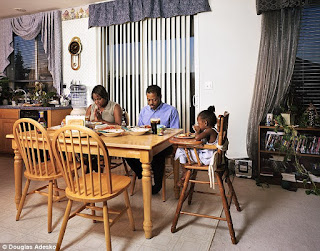ACTS 2:46: "And day by day, attending the temple together and breaking bread in their homes, they received their food with glad and generous hearts,"
I am confronted daily with young children who struggle. Their social skills have declined steadily over the years that I have been in the classroom. Taking turns, working in groups, understanding differences, and forgiving mistakes—these are tools that my students often lack. While many blame electronics, I believe that the extinction of sit down meals also plays a major role.
I have spent more than 30 years teaching elementary school, and the students who are the happiest and most well adjusted have adults who spend quality time with them, often over a meal.
It is during meal times, sans electronics, that children and teenagers can have the undivided attention of someone that loves them. This is the time when they can be debriefed from a stressful day, where a caring adult can help them cope with rules and conflict. It is also a time to celebrate their victories and accomplishments.This is when parents, sharing intimate conversations with their children, become their greatest teachers.
ACTS 2:42: And they devoted themselves to the apostles' teaching and the fellowship, to the breaking of bread and the prayers.
Where are your kids getting their feedback from? Their peers? Facebook? Twitter? TV?
"I'm so tired from working," you say. "We don't have the time to actually have sit down meals and conversations at the table." Have you considered that investing the time when your family is young may save you time and money later when you are carting them to counselors or bailing them out of trouble?
Think of it as an emotional investment portfolio that will pay priceless dividends later on.
Two of my three children died very young, and I am so grateful that I have a wealth of family meal memories. We prayed together, we told corny jokes, we brainstormed project ideas, we discussed strategies for dealing with bullies, and yeah, sometimes we argued, but most importantly, we connected.
But don't take my word for it—look at the evidence. Dr. Anne K. Fishel, author of "Home For Dinner: Mixing Food, Fun, and Conversation For A Happier Family And Healthier Kids", and co-founder of The Family Dinner Project.org. has spent years researching the topic. Her findings confirm that families that take time to break bread together have kids with a better academic performance, less depression, lower risk of substance abuse, lower risk of teen pregnancy, and more.Click to read more.
Cornell University did a study that backs up these findings and further states that family meals are an integral part of an overall positive family culture.Read more. The article recommends a minimum of 3 meals together a week.
The more I researched the more I found! Family meals make a difference!
I would like to challenge you, if you are not already doing so,to make this commitment to your children. To my Christian readers: Chauffeuring them to youth group and church does not replace our precious meal times together. Remember Jesus hosted the "last supper", not the "last sermon" or the "last youth camp."
What the articles do not say is that you have to be a gourmet cook, or even cook the food yourself. (However, there are a gazillion easy recipes and tips out there.)They do not even say that it has to be dinner. But they all do say that you need to turn off the TV and the electronics.
I am not surprised that my observations as a teacher are backed by solid research. In my classroom point system my students can earn treats and privileges. Can you guess what one of their favorite rewards is? Lunch bunch with the teacher. For a half hour they get my undivided attention where I can love on them. Sadly, many are not getting that at home. I am teaching them values that, once upon a time, we all learned at the dinner table.



